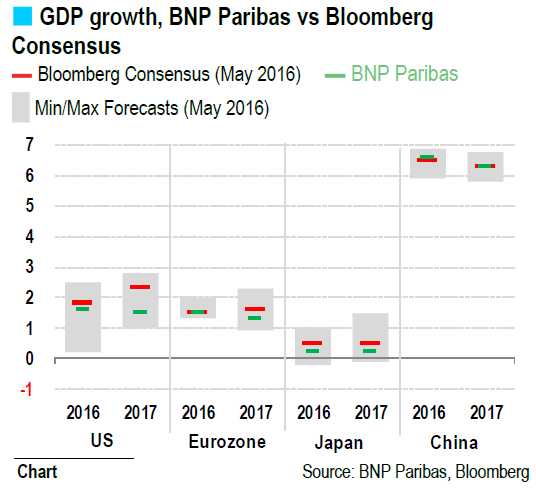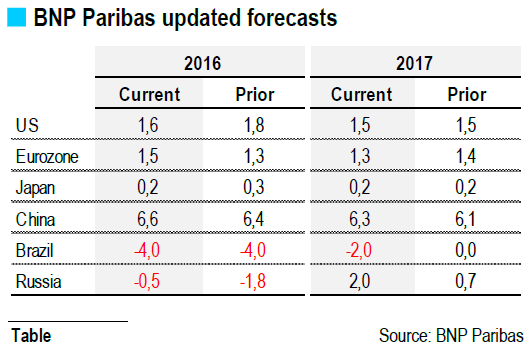- 2016 sees upward revisions to our GDP growth in the Eurozone and in emerging and developing economies. Downward revision in the US.
- Slight downward revision to the growth forecasts for the Eurozone in 2017. Upward revisions in emerging economies.
- Our US growth outlook, in particular for 2017, is lower than the consensus forecasts.
Our latest quarterly update of the outlook for the world economy has taken place against the background of significant change in key macro variables since the start of the year. Oil prices have rebounded very significantly after reaching a trough around mid-January and this has had a positive impact on emerging markets as well as on risk appetite of financial market investors. The stimulus efforts in China have brought relief after the nervousness in the second part of last year. They have caused an improvement in the economic data as well as a better sentiment in commodity markets and towards developing economies. The ECB has stepped up its effort to boost inflation, notably by extending the scope of its asset purchase programme. The Federal Reserve on the other hand has adopted a cautious stance. Its policy has been on hold though recent statements have shown an eagerness to proceed with a new tightening if the data allow. Finally, the Bank of Japan has grabbed headlines by introducing a negative deposit rate, a decision which caused quite some market turmoil.
In addition to the monetary divergence (Fed policy unchanged, more easing by the ECB and the Bank of Japan), we have also seen divergence in the real economy. Eurozone growth has been surprisingly strong in the first quarter, at least in terms of European standards; Japan has also seen growth, although this was related to the leap year for which no correction is made in the data, whereas the US saw very weak growth.
Advanced economies
For the US we expect 1.6% real GDP growth this year (coming from an earlier estimate of 1.8%) and 1.5% next year. The downward revision for 2016 is driven by a disappointing performance in the first quarter (+0.5% quarter on quarter, annualised) The Bloomberg consensus is respectively 1.8% and 2.3%. The IMF in its April World Economic Outlook has an estimate for 2016 of 2.4% and is forecasting 2.5% for next year. Growth this year will be driven by private consumption and residential investment with net exports and corporate investments acting as a drag. We expect corporate capital expenditures to suffer from the delayed effect of the tightening of financial and monetary conditions (the appreciation of the effective exchange rate of the dollar, wider credit spreads), although more recently these conditions have eased a bit. Even more important is the downward pressure on corporate profits which should act as a drag on investments. Next year, private consumption growth should slow a bit on the back of higher headline inflation (higher oil prices)
which should dent purchasing power. Residential investments should see some slower growth, all the more so if the Fed were to tighten (which is not our base scenario) and corporate investments should see a slight pick-up. All in all, growth next year should be more or less in line with this year’s performance. The bigger picture is that the US is close to full employment but that wage growth is nevertheless rather limited, which is capping the growth rate of household spending. Wage growth is a reflection of very slow productivity growth but nevertheless, unit labour costs are rising, which is impacting profits and hence investments. In such an environment we do not share the consensus view of a significant acceleration in growth next year. Inflation should accelerate from 1.2% to 2.1% but the core personal consumption expenditures deflator, a preferred metric of the Fed, should basically be stable (+1.6% this year, +1.7% next).

The Eurozone has been the surprising factor this year, in a positive sense that is. After a strong first quarter, survey indicators point towards somewhat slower growth but for the year as a whole we expect growth of 1.5% in 2016 and 1.3% in 2017 (Bloomberg consensus: 1.5% and 1.6%). The slower growth next year, albeit still above potential, is explained by the impact of higher oil prices and hence inflation on household consumption, somewhat slower corporate investment growth, the delayed impact of a stronger euro (on an effective exchange rate basis) and a less expansionary fiscal policy. Headline inflation should accelerate from 0.0% to 1.3% on the back of higher oil prices. Core inflation should remain stable (0.8% this year, 0.9% next): the negative output gap takes time to narrow significantly and euro strength weighs on inflation as well.
In Japan we expect 0.2% real GDP growth this year and next (Bloomberg consensus has 0.5% for 2016 and 2017) with government consumption being the fastest growing demand component. This illustrates the effort of the government to boost growth in an environment where monetary policy is having less and less of an impact on activity. The real issue for Japan however is the supply side: trend GDP growth is virtually zero in an economy with a shrinking labour force and hardly any productivity growth.
Emerging and developing economies
This universe has seen the bigger changes compared to our February forecasts. We have revised our China forecast for this year from 6.4% to 6.6% and for next year we expect +6.3% coming from +6.1% (Bloomberg consensus: +6.5% and +6.3%). We have an upward revision of our forecasts for Russia to -0.5% (+1.3%) and +2.0% (+1.3%). For Brazil we have -4.0% for this year (unchanged compared to our previous forecast) and +2.0% for next (0.0% before).
The improved picture in China is the result of the fiscal stimulus efforts of the government although the significant acceleration of M1 growth also plays a role. The latter has helped the property market and construction activity. The ensuing acceleration of growth should however be short-lived and faced with structural challenges (excess capacity, debt, credit quality), we expect growth to slow again next year.
We think that the worst is over in Russia. Leading indicators signal an upturn which is related to the rise in oil prices. Lower inflation should underpin private consumption and together with a stronger RUB should allow an easing of monetary policy with a positive impact on growth.
In Brazil, the new government has brightened the policy outlook. Falling inflation on the back of a huge negative output gap paves the way for significant interest rate cuts starting later this year and this will contribute to growth turning positive.
The challenges of 2017
It looks like 2017 will be challenging in several ways. Our US growth forecast is well below the consensus forecast as well as the Federal Reserve’s own median projection of 2.1% real GDP growth. It is clear that depending on the outcome, the outlook for monetary policy will be quite different. Soft growth would imply a Federal Reserve which is on hold. If growth would be more in line with the Fed’s projection or the consensus forecast, concern about monetary policy tightening would be a recurring theme, weighing on the market environment, domestically and abroad, all the more so considering that financial markets have adopted a very dovish stance in terms of pricing in rate hikes. A more volatile market environment could very well have negative feedback effects to the real economy, in particular corporate investments, because of the uncertainty it would entail.
Another challenge will be gauging the impact of the rise in headline inflation on the back of a base effect related to the increase in oil prices. Not only will this weigh on households’ real disposable income and hence consumer spending, but it should also impact inflation expectations. A key question will be whether this will influence the stance of monetary policy. When oil prices were declining, the dominating view was that the spill over effects on core inflation would be limited. Will the same thinking apply now that oil prices are going up? This question is of course particularly relevant for the Eurozone and ECB policy.

by William DE VIJLDER
